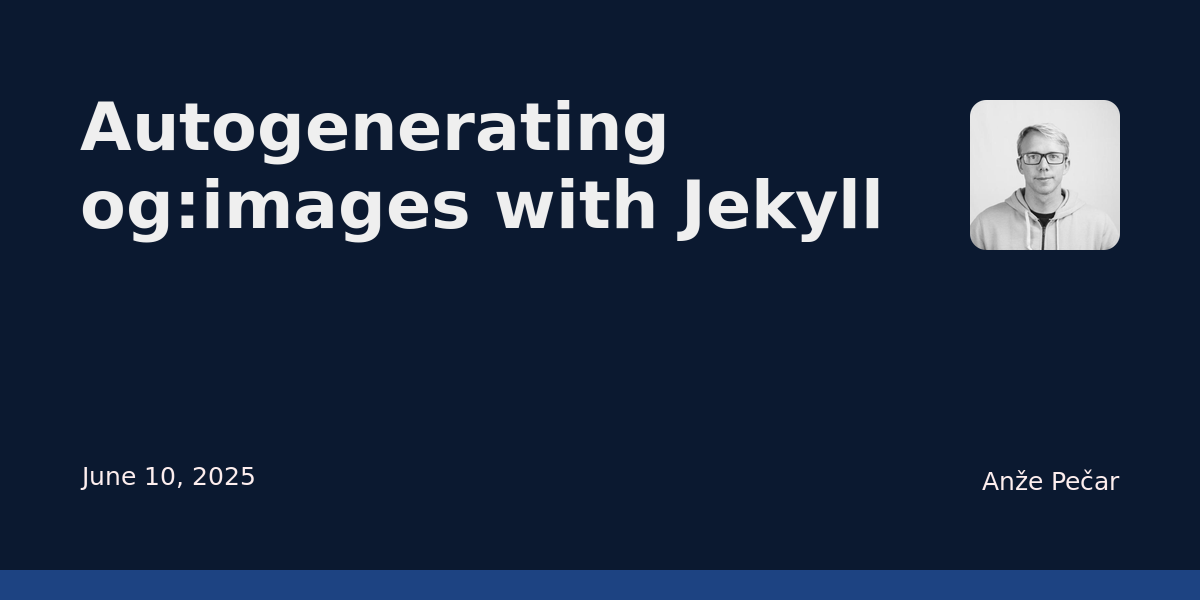Autogenerating og:images with Jekyll
This blog has been a static site powered by Jekyll for over 13 years, and I’ve been happy with the setup. After all this time, I still enjoy using my code editor to write new posts and git commit and git push to publish them.
However, there was one issue that often discouraged me from writing: I had to switch out of the code editor to generate the Open Graph image that appears on social media when I share the link to the blog post. For this particular blog post, this image looks like this:

jekyll-og-image
Today, I finally set aside some time to figure out how to automate this process. Luckily, there exists a Jekyll plugin that solves this problem: jekyll-og-image.
Before I could use jekyll-og-image, I had to first configure jekyll-seo-tag. At first, I was annoyed by this, but in the end, I was delighted with the result. After adding a few settings into _config.yml, the plugin allowed me to remove over 20 lines of tags from my layout:
diff --git a/_layouts/default.html b/_layouts/default.html
index abb2143a..362c5e4 100644
--- a/_layouts/default.html
+++ b/_layouts/default.html
@@ -11,32 +11,9 @@
<meta name="viewport" content="width=device-width, initial-scale=1" />
<link rel="icon" type="image/png" sizes="32x32" href="/favicon-32x32.png" />
<link rel="icon" type="image/png" sizes="16x16" href="/favicon-16x16.png" />
- <!-- Primary Meta Tags -->
- <title>{{ page.title }}</title>
- <meta name="title" content="{{ page.title }}">
- <meta name="description" content="{{ page.description }}" />
- <meta name="author" content="{{ site.author.name }}" />
- <link rel="canonical" href="{{site.url }}{{ page.url }}" />
-
- <!-- Open Graph / Facebook -->
- <meta property="og:type" content="website">
- <meta property="og:url" content="{{site.url }}{{ page.url }}" />
- <meta property="og:title" content="{{ page.title }}" />
- <meta property="og:description" content="{{ page.description }}" />
- {% if page.image %}
- <meta property="og:image" content="{{site.url }}/{{ page.image }}" />
- {% else %}
- <meta property="og:image" content="{{site.url }}/assets/me.jpg" />
- {% endif %}
- <!-- Twitter -->
- <meta name="twitter:card" content="summary_large_image" />
- <meta name="twitter:creator" content="@anze3db" />
- <meta name="twitter:title" content="{{ page.title }}" />
- {% if page.image %}
- <meta name="twitter:image" content="{{site.url }}/{{ page.image }}" />
- {% else %}
- <meta name="twitter:card" content="summary" />
- {% endif %}
+ {% seo %}
+
<!-- RSS Link -->
<link rel="alternate" type="application/rss+xml" href="{{ production_url }}/feed.xml" title="{{ site.title }}" />
<!-- CSS -->
👏
Once jekyll-seo-tag was configured, I had to install one more dependency: libvips. jekyll-og-image uses this image processing library to generate the images. I installed it with Brew but I also needed to add it to my GitHub Actions runner as documented by the jekyll-og-image docs.
After that, I was finally able to add the gem 'jekyll-og-image' to my Gemfile and start generating the images as part of the Jekyll build command. But of course the first build failed! 💥
Invalid markup in text
The build failed with the following stack trace:
/opt/homebrew/lib/ruby/gems/3.3.0/gems/ruby-vips-2.2.4/lib/vips/operation.rb:228:in `build': text: invalid markup in text (Vips::Error)
from /opt/homebrew/lib/ruby/gems/3.3.0/gems/ruby-vips-2.2.4/lib/vips/operation.rb:481:in `call'
from /opt/homebrew/lib/ruby/gems/3.3.0/gems/ruby-vips-2.2.4/lib/vips/image.rb:234:in `method_missing'
from /opt/homebrew/lib/ruby/gems/3.3.0/gems/jekyll-og-image-2.0.0/lib/jekyll_og_image/element/text.rb:25:in `apply_to'
from /opt/homebrew/lib/ruby/gems/3.3.0/gems/jekyll-og-image-2.0.0/lib/jekyll_og_image/element/canvas.rb:30:in `text'
from /opt/homebrew/lib/ruby/gems/3.3.0/gems/jekyll-og-image-2.0.0/lib/jekyll_og_image/generator.rb:123:in `add_header'
from /opt/homebrew/lib/ruby/gems/3.3.0/gems/jekyll-og-image-2.0.0/lib/jekyll_og_image/generator.rb:85:in `generate_image_for_document'
from /opt/homebrew/lib/ruby/gems/3.3.0/gems/jekyll-og-image-2.0.0/lib/jekyll_og_image/generator.rb:47:in `block in process_collection'
from /opt/homebrew/lib/ruby/gems/3.3.0/gems/jekyll-og-image-2.0.0/lib/jekyll_og_image/generator.rb:26:in `each'
from /opt/homebrew/lib/ruby/gems/3.3.0/gems/jekyll-og-image-2.0.0/lib/jekyll_og_image/generator.rb:26:in `process_collection'
from /opt/homebrew/lib/ruby/gems/3.3.0/gems/jekyll-og-image-2.0.0/lib/jekyll_og_image/generator.rb:10:in `block in generate'
from /opt/homebrew/lib/ruby/gems/3.3.0/gems/jekyll-og-image-2.0.0/lib/jekyll_og_image/generator.rb:9:in `each'
from /opt/homebrew/lib/ruby/gems/3.3.0/gems/jekyll-og-image-2.0.0/lib/jekyll_og_image/generator.rb:9:in `generate'
from /opt/homebrew/lib/ruby/gems/3.3.0/gems/jekyll-4.3.4/lib/jekyll/site.rb:193:in `block in generate'
from /opt/homebrew/lib/ruby/gems/3.3.0/gems/jekyll-4.3.4/lib/jekyll/site.rb:191:in `each'
from /opt/homebrew/lib/ruby/gems/3.3.0/gems/jekyll-4.3.4/lib/jekyll/site.rb:191:in `generate'
from /opt/homebrew/lib/ruby/gems/3.3.0/gems/jekyll-4.3.4/lib/jekyll/site.rb:79:in `process'
from /opt/homebrew/lib/ruby/gems/3.3.0/gems/jekyll-4.3.4/lib/jekyll/command.rb:28:in `process_site'
from /opt/homebrew/lib/ruby/gems/3.3.0/gems/jekyll-4.3.4/lib/jekyll/commands/build.rb:65:in `build'
from /opt/homebrew/lib/ruby/gems/3.3.0/gems/jekyll-4.3.4/lib/jekyll/commands/build.rb:36:in `process'
from /opt/homebrew/lib/ruby/gems/3.3.0/gems/jekyll-4.3.4/lib/jekyll/command.rb:91:in `block in process_with_graceful_fail'
from /opt/homebrew/lib/ruby/gems/3.3.0/gems/jekyll-4.3.4/lib/jekyll/command.rb:91:in `each'
from /opt/homebrew/lib/ruby/gems/3.3.0/gems/jekyll-4.3.4/lib/jekyll/command.rb:91:in `process_with_graceful_fail'
from /opt/homebrew/lib/ruby/gems/3.3.0/gems/jekyll-4.3.4/lib/jekyll/commands/build.rb:18:in `block (2 levels) in init_with_program'
from /opt/homebrew/lib/ruby/gems/3.3.0/gems/mercenary-0.4.0/lib/mercenary/command.rb:221:in `block in execute'
from /opt/homebrew/lib/ruby/gems/3.3.0/gems/mercenary-0.4.0/lib/mercenary/command.rb:221:in `each'
from /opt/homebrew/lib/ruby/gems/3.3.0/gems/mercenary-0.4.0/lib/mercenary/command.rb:221:in `execute'
from /opt/homebrew/lib/ruby/gems/3.3.0/gems/mercenary-0.4.0/lib/mercenary/program.rb:44:in `go'
from /opt/homebrew/lib/ruby/gems/3.3.0/gems/mercenary-0.4.0/lib/mercenary.rb:21:in `program'
from /opt/homebrew/lib/ruby/gems/3.3.0/gems/jekyll-4.3.4/exe/jekyll:15:in `<top (required)>'
from /opt/homebrew/lib/ruby/gems/3.3.0/bin/jekyll:25:in `load'
from /opt/homebrew/lib/ruby/gems/3.3.0/bin/jekyll:25:in `<top (required)>'
from /opt/homebrew/Cellar/ruby/3.3.5/lib/ruby/3.3.0/bundler/cli/exec.rb:58:in `load'
from /opt/homebrew/Cellar/ruby/3.3.5/lib/ruby/3.3.0/bundler/cli/exec.rb:58:in `kernel_load'
from /opt/homebrew/Cellar/ruby/3.3.5/lib/ruby/3.3.0/bundler/cli/exec.rb:23:in `run'
from /opt/homebrew/Cellar/ruby/3.3.5/lib/ruby/3.3.0/bundler/cli.rb:455:in `exec'
from /opt/homebrew/Cellar/ruby/3.3.5/lib/ruby/3.3.0/bundler/vendor/thor/lib/thor/command.rb:28:in `run'
from /opt/homebrew/Cellar/ruby/3.3.5/lib/ruby/3.3.0/bundler/vendor/thor/lib/thor/invocation.rb:127:in `invoke_command'
from /opt/homebrew/Cellar/ruby/3.3.5/lib/ruby/3.3.0/bundler/vendor/thor/lib/thor.rb:527:in `dispatch'
from /opt/homebrew/Cellar/ruby/3.3.5/lib/ruby/3.3.0/bundler/cli.rb:35:in `dispatch'
from /opt/homebrew/Cellar/ruby/3.3.5/lib/ruby/3.3.0/bundler/vendor/thor/lib/thor/base.rb:584:in `start'
from /opt/homebrew/Cellar/ruby/3.3.5/lib/ruby/3.3.0/bundler/cli.rb:29:in `start'
from /opt/homebrew/Cellar/ruby/3.3.5/lib/ruby/gems/3.3.0/gems/bundler-2.5.18/exe/bundle:28:in `block in <top (required)>'
from /opt/homebrew/Cellar/ruby/3.3.5/lib/ruby/3.3.0/bundler/friendly_errors.rb:117:in `with_friendly_errors'
from /opt/homebrew/Cellar/ruby/3.3.5/lib/ruby/gems/3.3.0/gems/bundler-2.5.18/exe/bundle:20:in `<top (required)>'
from /opt/homebrew/opt/ruby/bin/bundle:25:in `load'
from /opt/homebrew/opt/ruby/bin/bundle:25:in `<main>'
After a small amount of frustration I figured out that half of the images were generated correctly. This made me think that the root cause had to be one particular blog post. Enabling verbose mode led me to a blog post that had an & symbol in the title. There is a closed issue about this, but it looks like it either regressed or wasn’t fixed fully. My solution was simple: I replaced the ampersand with an and & moved on with my life!
Second problem
I thought I was out of the woods at this point but after I pushed the changes to production the generated images were returning 404s. I verified that the images were being generated correctly in the GitHub action and then finally found out that they were not copied to the _site folder correctly. The _site includes all the static files that get uploaded to GitHub Pages so if files are missing they won’t be accessible once the site is deployed. There is also an existing issue about this as well.
I noticed that rebuilding the project a second time correctly copies the generated images to the _site folder, so my solution was to run the build twice:
- name: Build with Jekyll
# Outputs to the './_site' directory by default
# Build twice because the first run doesn't copy generated images
run: |
bundle exec jekyll build --baseurl "$"
bundle exec jekyll build --baseurl "$"
Configuration
After all the issues were resolved, I started fiddling with the configuration to make the generated images nicer. I settled on a dark blue and light blue theme with white text, as shown at the beginning of the post. The configuration for it is here:
og_image:
collections: ["posts"]
output_dir: "assets/images/og"
image: "/assets/images/anze.jpeg"
canvas:
background_color: "#0b1930"
header:
font_family: "Roboto, Bold"
color: "#EFEFEF"
content:
font_family: "Roboto"
color: "#FEEFEF"
border_bottom:
width: 30
fill:
- "#1d4382"
Fin
And that was it. I now have og:images auto-generated by Jekyll! Hopefully, this will remove some of the friction and encourage me to blog more often! 🤞